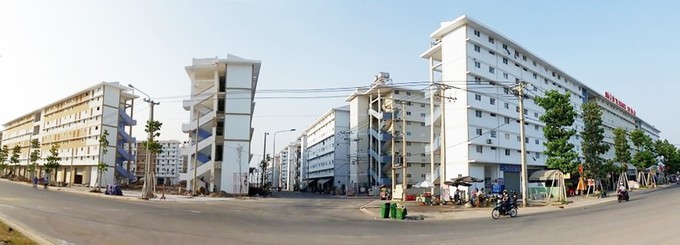Affordable houses in Southeast provinces not met great demand
Despite efforts made by governments in Binh Duong and Dong Nai provinces, just a few affordable houses in the Southeast provinces were built failing to meet great demand.

Great demand for affordable houses
With the rapid development of industrial parks (IPs), over the years, Binh Duong and Dong Nai provinces have attracted a large number of workers from outside the province. To partly meet the settlement needs of workers, administrations in Binh Duong and Dong Nai provinces have implemented projects to build social housing and housing for workers. However, housing construction projects have not kept up with demand.
From 2000 to the present, the population of Binh Duong Province has increased by more than 1.6 million people, with an average increase of about 84,000 people a year, of which the majority are immigrants. Currently, the rate of immigrant workers having to rent a house is the highest in the country at 74.5 percent. According to the Department of Construction of Binh Duong Province, in the period 2016-2020, the province had 17 projects and 1 social housing project invested with a land area of about 132 hectares.
By 2021, the province called for investment in building social houses and had special policies to attract investors. Several projects with more than 1.8 million square meters were put into use. However, the housing needs of workers and low-income people are much greater.
About 410,597 workers in industrial parks in Dong Nai province are in need of accommodation whereas social housing projects only meet about 6.5 percent of the need. According to the plan, by 2025, Dong Nai will have three more industrial parks while there are currently 31 existing industrial parks with completed technical infrastructure systems and about 56,700 workers. So in the next 3 years, there will be about 450,000 workers in industrial parks in need of accommodation.
To meet this need, in 2022, Dong Nai Provincial Party Committee issued Resolution No. 07/NQ/TU with the goal of implementing 10,000 social housing units from 2021 to 2025. Immediately after the policy was issued, localities submitted documents for 10 projects comprising 13,000-15,000 apartments, but so far only three projects have been approved by Dong Nai province providing more than 2,000 apartments.
Problems in administrative procedures will be solved
Provincial administrations identified major obstacles and difficulties in developing social housing and worker housing including the complicated and lengthy procedures for investing in construction and buying and selling social houses. Plus, social housing buyers must be evaluated by competent agencies.
In addition, according to real estate businesses, determining house prices before selling, renting, or leasing for social housing using non-budget capital must be appraised by provincial-level state agencies, which takes a long time. Property enterprises voiced that incentive policies for investors are not really attractive, for instance, profits from selling social housing must not exceed 10 percent of the total investment cost while the profit must not exceed 15 percent of the total investment cost for social housing for lease or lease purchase.
To achieve the goal of the social housing development project for the period 2021-2025, with an orientation to 2030 of building around 190,966 houses, Binh Duong province has proposed solutions. Specifically, as soon as the social housing development project is approved, the authorities will review the plans as a basis for building the Social Housing Development Plan until 2025 and annually as well as complete policy mechanisms to encourage investment and promote the construction of social housing for lease.
The province prioritizes the use of land directly managed by state-owned enterprises and land areas for the relocation of industrial zones and clusters in Thuan An and Di An cities for social housing projects.
According to the social housing development plan until 2025, Dong Nai Province reserves 700 hectares of land fund for social housing in districts and cities excluding the 20 percent land fund in commercial housing projects. In order to promote the development of social housing, Dong Nai Province requires people's committees of districts and cities to be responsible for preparing investment policies for appraisal and approval which will serve as a basis for investment appeal.








